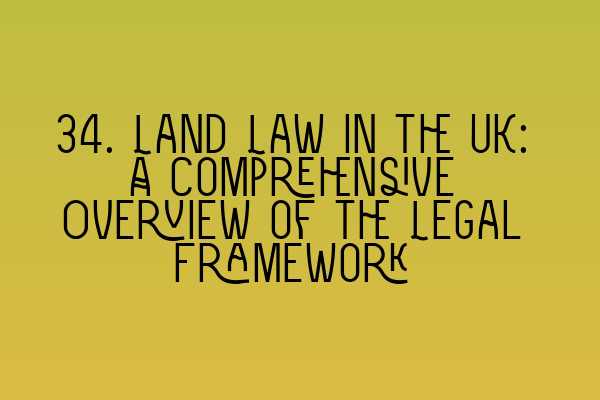Land Law in the UK: A Comprehensive Overview of the Legal Framework
Welcome to the blog of SQE Property Law & Land Law! In this post, we will provide you with a comprehensive overview of land law in the UK. Whether you are a law student, a newly qualified solicitor, or simply someone with an interest in property law, we believe you will find this guide informative and helpful.
1. Introduction
Land law forms an integral part of the legal system in the UK. It governs the rights and obligations related to land and property, ensuring fair and efficient transactions in the real estate market. Understanding the legal framework surrounding land law is crucial for anyone dealing with property-related matters.
Before we dive into the details, if you are preparing for the SQE 1 exam, we highly recommend practicing with our SQE 1 Practice Exam Questions and taking our SQE 1 Practice Mocks FLK1 FLK2 to enhance your knowledge and boost your confidence.
2. Key Concepts
Land law encompasses a wide range of legal principles and concepts. Here are some key terms and concepts to familiarize yourself with:
- Legal Estate: This refers to the extent of a person’s rights and interests in land.
- Equitable Interest: These are rights and interests that are enforceable in equity but do not amount to a legal estate.
- Freehold: A freehold estate gives the holder ownership of the land for an indefinite period.
- Leasehold: A leasehold estate grants the holder the right to use and occupy the land for a specific period.
- Registered Land: Land that is registered with the Land Registry and has a registered title.
- Unregistered Land: Land that is not registered with the Land Registry.
3. Types of Ownership
In land law, there are different types of ownership that determine the extent of an individual’s rights and interests in land:
- Joint Tenancy: Joint tenants have equal and undivided interests in the property. In the event of one tenant’s death, their share passes to the surviving tenants.
- Tenancy in Common: Tenants in common have separate and distinct shares in the property. Their shares can be passed on to their beneficiaries upon death.
- Sole Ownership: This occurs when a person owns the property on their own, without any co-owners. They have full control over the property.
4. Land Registration
Registration of land with the Land Registry is an important aspect of land law in the UK. Registered land provides greater certainty and protection of rights. However, unregistered land is subject to different rules:
- Registered Land: Registered land has a registered title, and ownership and interests are recorded in the Land Registry.
- Unregistered Land: Unregistered land does not have a registered title, and ownership is evidenced by deeds and other relevant documents.
For aspiring solicitors, understanding the intricacies of land registration is essential. We offer comprehensive SQE 2 Preparation Courses that cover land registration in detail.
5. Landlord and Tenant Law
Landlord and tenant law governs the rights and responsibilities of landlords and tenants in relation to leased property. These laws cover areas such as rent, repairs, termination of tenancy, and eviction:
- Assured Shorthold Tenancies (ASTs): Most residential tenancies in the UK fall under this category. They provide certain rights and protections to tenants.
- Commercial Leases: Commercial leases involve the renting of property for business purposes. They often have different terms and conditions than residential tenancies.
6. Easements and Covenants
Easements and covenants are important legal concepts in land law. They govern the rights and obligations between different landowners:
- Easements: Easements are rights that one party has over another’s land. They can include rights of way, rights of light, and rights to access and use shared facilities.
- Covenants: Covenants are contractual obligations that run with the land. They can restrict certain land uses or require the landowner to perform specific actions.
Understanding the intricacies of easements and covenants is crucial when dealing with property transactions. Our SQE 1 Preparation Courses provide comprehensive coverage of these topics.
7. Adverse Possession
Adverse possession refers to the acquisition of someone else’s land through continuous and exclusive possession without the owner’s consent. The law surrounding adverse possession can be complex and requires careful analysis of the specific circumstances:
If you are preparing for the SRA SQE exam, be sure to check out our SRA SQE Exam Dates to plan your studies effectively.
8. Conclusion
Land law in the UK encompasses a vast array of legal principles and concepts. Whether you are a law student or a legal professional, having a comprehensive understanding of the legal framework surrounding land law is essential.
We hope this overview has provided you with valuable insights into land law in the UK. If you have any questions or require further assistance in preparing for your SQE exams, please don’t hesitate to reach out to SQE Property Law & Land Law.
Good luck with your studies and future career in property law!
